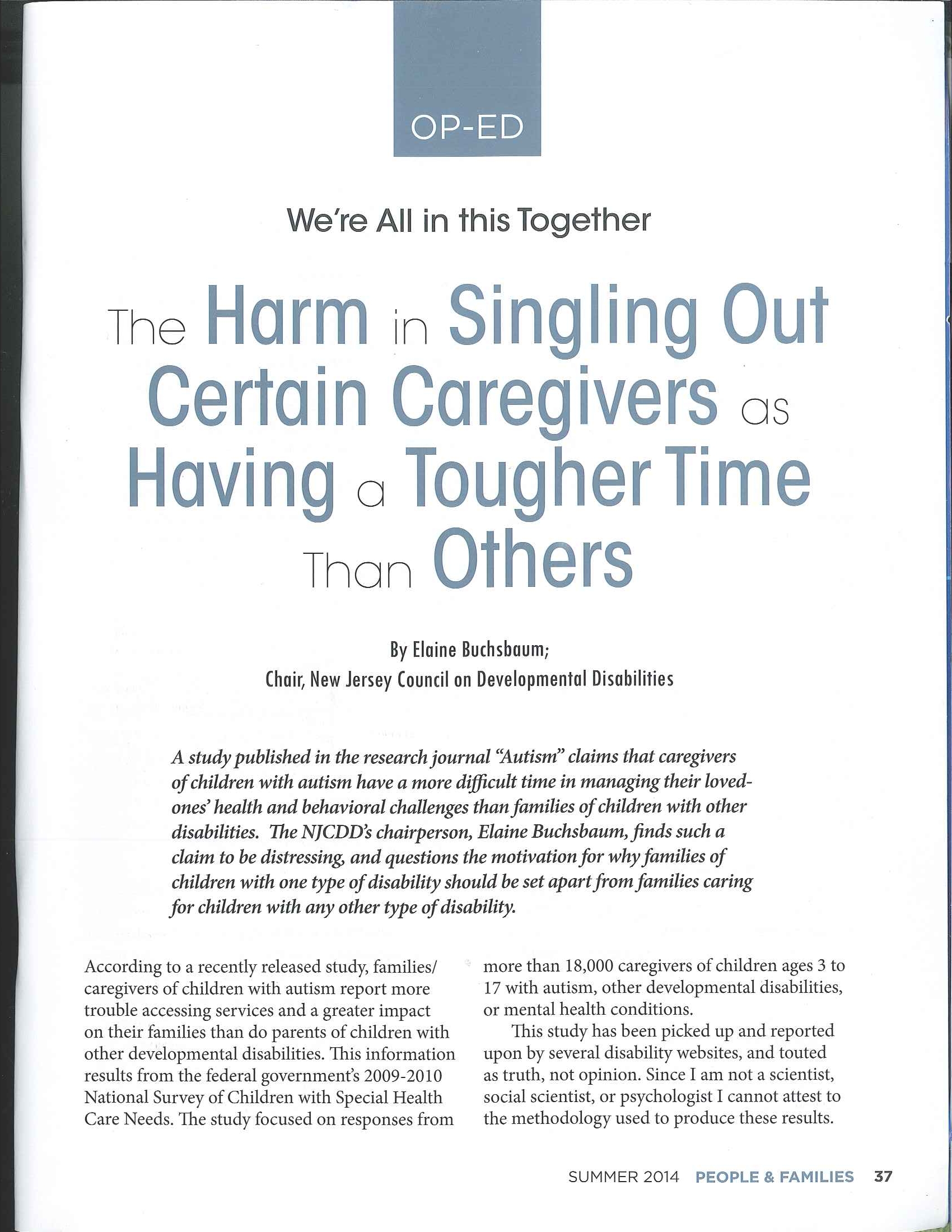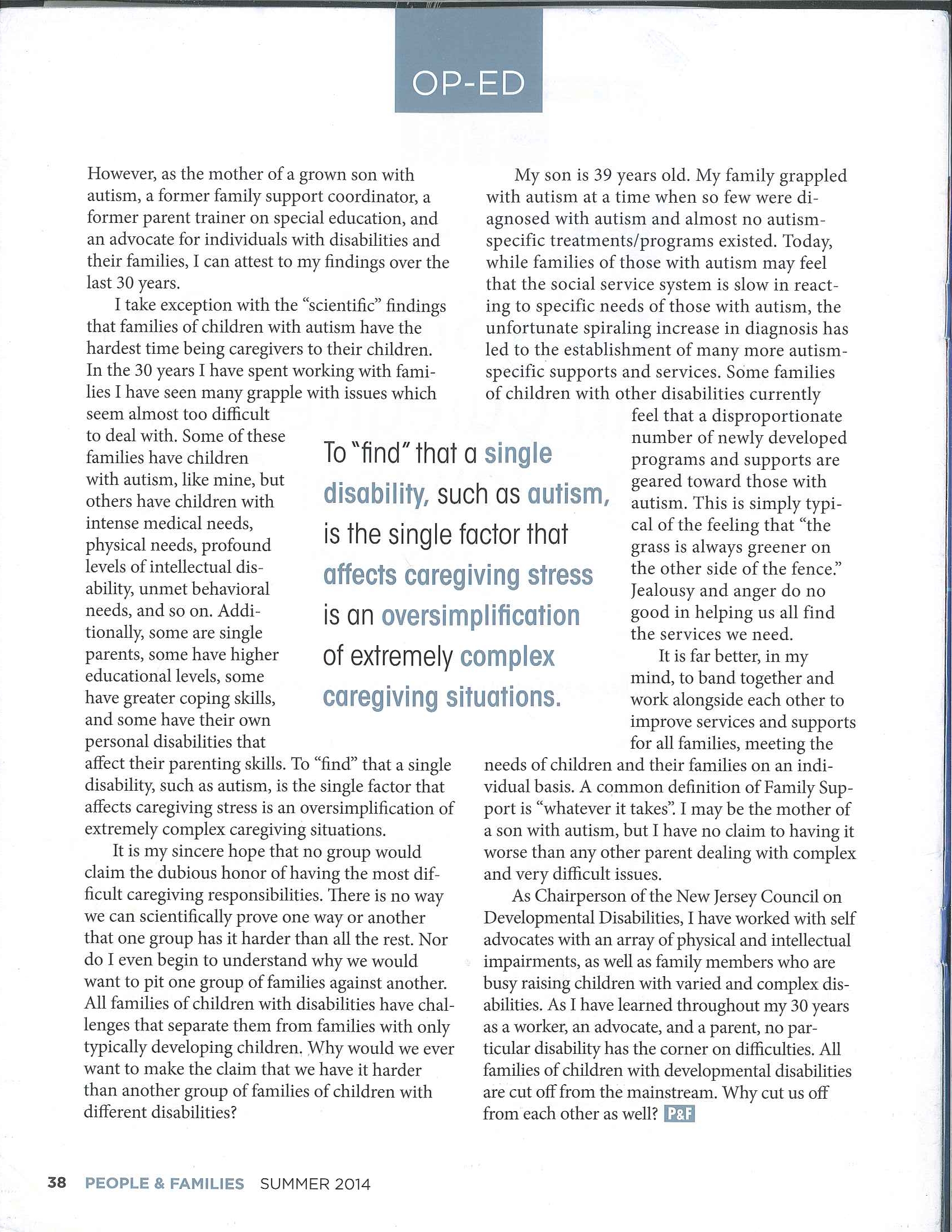We beleive this opinion essay by Elaine Buschsbaum, former Chair of the New Jersey DD Council, is very thoughtful! 

Category Archives: Family
Partners Couple Creates Project Special Courage
See story of PIP grad Lisa Turner and her husband, incoming PIP student, in the Tulsa World. They discuss frustrations with the OK Health Care Authority and raising their young adult daughter.
You can also join Project Special Courage‘s Facebook page.
Resources for Inclusive, Interdependent Communities
Att eh DD Council, we are BIG fans of Jon McKnight and his colleagues and many of his books are in our library. Here are some online, free resources:
Community Organizing by John McKnight (2013)
The Classic Duo: Accountability and Community Development Can Help Unlock an Abundance of Resources by Dan Duncan (2012).
Gift of Individuals by Mike Green. Also see his geat article on community building, “The Right Ducks.”
Also see Green’s Person-Centered and Community-Centered Inclusion Work.
TimeBanking is a way of giving and receiving to build supportive networks and strong communities. One hour helping another earns one TimeBank Hour (also called time credits, service credits or time dollars.) TimeBanking builds on the magic of “pay it forward,” one good turn leading to another and another.
Finally, a very BIG resource is the 46 chapter Community Toolbox — worth your time to go through!
Intimacy & Relationships: Sexuality
Be advised each of the videos contain mature matter and frank discussions about sexuality and parental guidance is advised:
The Intimacy Questions: Relationships and Disability
“Can You Have Sex?” Asking People with Disabilities None -of-Your- Beeswax Questions
Social Security: “Child Disability Starter Kit”
Social Security provides a fact sheet and starter kit if you are considering applying for a child (under age 18) to receive Social Security Income (SSI) benefits. This is different from SSDI (disability pay for working adults).
A few things to know before you get started:
Social Security has a strict definition of disability for children.
- The child must have a physical or mental condition(s) that very seriously limits his or her activities; and
- The condition(s) must have lasted, or be expected to last, at least 1 year or result in death.
A state agency makes the disability decision. They will ask for information from medical and school sources and other people who know about the child.
If the state agency needs more information, they will arrange an examination or test for the child, which we will pay for.
Social Security also consider the family’s household income, resources and other personal information.
Institutionalized Lives
The videos here may contain graphic images and parental guidance is advised.
Suffer the Little Children (1968) of Pennhurst State Home (PA)
Forgotten People by Mental Disability Rights International.
Olmstead: A Case for Community Support
Where’s Molly? The full-length documentary is available for viewing the the OK DD Council.
Matthew’s Story from Not Home: A Documentary About Kids Living in Nursing Facilities.
Visitability & Home Design
Visitability is a disability advocacy movement to create systemic change in new home construction so that all persons can feel welcomed. Thinking about these issues as you build or participate in city planning is a great Partners practice!
Learn more at Concrete Change as well as Advocating for Universal Design.
Informed Decisions About Guardianship
The following explain guardianship as well as other options:
Oklahoma’s Senior Law Center publishes Striking a Balance as well as Who Decides?
A state by state guide on adult guardianship can be found here.
A brief article, Guardianship Is Not Self-Determination, by Kathy Harris, 2012.
Here is the Oklahoma law concerning guardians and wards:
Title 30. Guardian and Ward
Oklahoma Guardianship and Conservatorship Act
Appointment of Guardian
Article Article III – Adults
Section 3-106 – Rights of Incapacitated or Partially Incapacitated Person –
A. In all hearings conducted pursuant to Article III of the Oklahoma Guardianship and Conservatorship Act, an individual who is alleged to be or found to be an incapacitated or partially incapacitated person shall have a right to:
1. Notice as provided in Section 3-110 of this title;
2. Be present at such hearings;
3. Compel the attendance of witnesses;
4. Present evidence;
5. Cross-examine witnesses;
6. Appeal adverse orders and judgments as provided by the rules of civil procedure;
7. Representation by court-appointed counsel upon request; and
8. Request that the proceedings be closed to the public.
B. The requirement of notice to the subject of the proceeding shall not be waived. The requirement that the subject of the proceeding be present at a hearing may be waived only for good cause shown. The court shall make inquiries to determine whether there is sufficient cause to waive the right to be present. Whenever the requirement that the subject of the proceeding be present is waived, the court shall make a finding on the record as to the reason the subject of the proceeding is not present at the proceeding and the alternatives which were considered to enable the subject of the proceeding to be present.
C. Any person may apply for permission to participate in a proceeding or to be admitted to a proceeding which has been closed to the public. The court may grant the request to participate upon determining that the best interest of the subject of the proceeding will be served thereby. The court may, for good cause shown, grant the request of such person for permission to be admitted to the closed proceeding upon determining that said person has a legitimate interest in the proceedings. In granting either request, the court may impose any appropriate conditions it deems necessary.
D. If the subject of the proceeding is under the influence of psychotropic medication, during any judicial hearing held pursuant to the Oklahoma Guardianship and Conservatorship Act, the court shall be advised of this fact, the purpose of the medication, and the effect which it may have on the individual’s actions, demeanor and participation at the hearing.
E. Statements of individuals alleged or found to be partially incapacitated or incapacitated persons made during the course of the evaluations, examinations and treatment pursuant to the Oklahoma Guardianship and Conservatorship Act shall be privileged and confidential. Such statements shall not be admissible without the individual’s consent in any civil or criminal proceeding other than a proceeding held pursuant to the Oklahoma Guardianship and Conservatorship Act.
F. A party to a proceeding held pursuant to the Oklahoma Guardianship and Conservatorship Act may be relieved of court costs and filing fees as specified by Section 152 of Title 28 of the Oklahoma Statutes or as provided by Section 192 of Title 56 of the Oklahoma Statutes.
G. At the request of any party to a proceeding pursuant to the provisions of the Oklahoma Guardianship and Conservatorship Act, the court shall order that a stenographic or mechanical record of the proceeding be made.
What Does That Mean?
“Disability world” is filled with acronyms, diagnoses and terms we may be unfamiliar with. The resources below are helpful and we encourage you to share them in your communities.
The Alphabet Soup Book is a publication by the Center for Learning and Leadership/Oklahoma’s University Center for Excellence in Developmental Disabilities (UCEDD) hat explains disability-related acronyms.
The Center for Parent Information and Resources has a similar web-based resource.
Parents with Disabilities
The National Council on Disability freely provides a 400+ page report on the experiences of parents with disabilities.
Through the Looking Glass is parent education agency, based in CA, that supports parents who have disabilities in their child rearing choices. They also focus on finding baby and child items that can accommodate patents with disabilities.